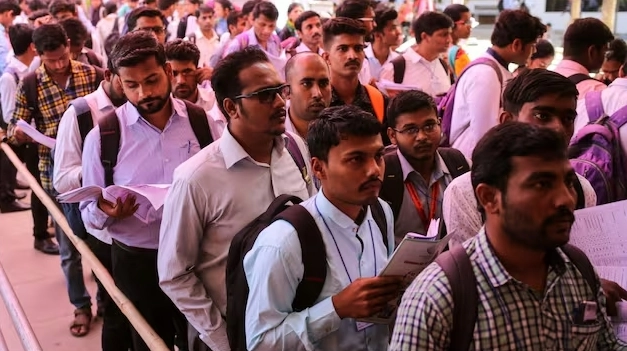
The Centre on Wednesday rejected a report by Reuters on India’s jobless rate, saying that the article suffered from a “lack of statistical foundation and relies on unverifiable perceptions rather than data-driven evidence".
According to the data from the Periodic Labour Force Survey (PLFS), the Labour Force Participation Rate (LFPR) for individuals aged 15 years and above has increased from 49.8% in 2017–18 to 60.1% in 2023–24. During the same period, the Worker Population Ratio (WPR) rose from 46.8% to 58.2%, while the Unemployment Rate (UR) declined sharply from 6.0% to 3.2%.
However, Reuters reported that a poll of independent economists has said that the unemployment rate, at 5.6% in June, was inaccurate and masked the severity of joblessness in India. Several of these economists said the true jobless rate is around twice the official figure.
Defending the official figures, the Ministry of Labour and Employment said the article presents a “sceptical narrative" on the accuracy of India’s official unemployment statistics and primarily relies on a perception-based survey of around 50 unnamed economists.
“The article’s foundation on expert opinions rather than verifiable data raises significant concerns about methodological rigour. There is no disclosure about who these economists are, the basis of their selection, or whether they reflect a cross-section of independent, academic, public, or private sector analysts. This lack of transparency introduces potential for selection bias and ideological filtering," the Ministry said in an official release.
“Furthermore, the article does not clarify if the opinion of the economists is based on rigorous surveys and analysis, the structure of questions asked, the metrics used, or the standards for interpreting data—thus undermining the replicability and credibility of its conclusions," it added.
The Centre argued that expert opinion cannot be a substitute for large-scale, representative, and methodologically robust surveys, and that the PLFS is a scientifically designed, transparent, and internationally benchmarked mechanism. The government had previously argued that the PLFS uses Computer-Assisted Personal Interviews to improve data quality and reduce errors.
“Reuters article suffers from a lack of statistical foundation and relies on unverifiable perceptions rather than data-driven evidence. In contrast, the PLFS stands as a scientifically designed, transparent, and internationally benchmarked mechanism for tracking India’s diverse and evolving labour market," the Labour Ministry said.
The government also highlighted that perception-based polls typically involve subjective biases and cannot substitute systematically collected, statistically sound data.
“The Reuters poll is based solely on the perceptions of a select group of economists, which, while offering viewpoints, are prone to personal bias and do not offer the methodological rigour or empirical depth of a national-level labour force survey," it added.
It said the representation in the article was misleading and failed to acknowledge the structural improvements underway in India’s labour market.